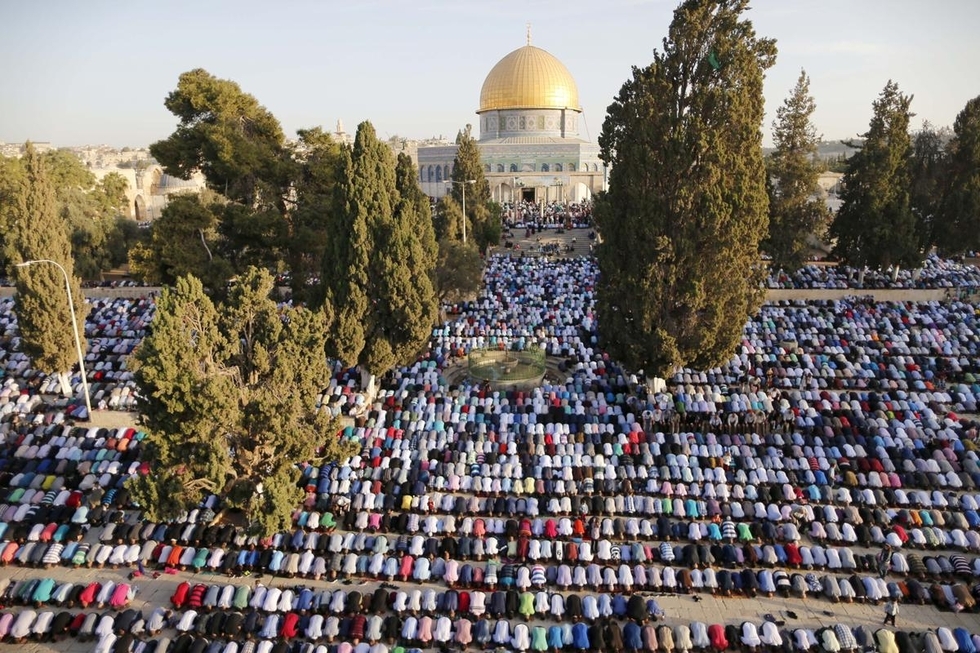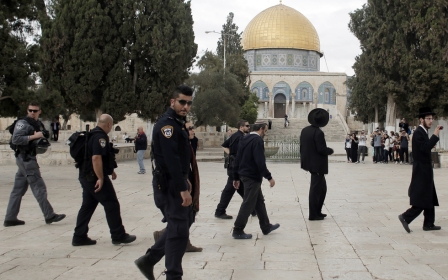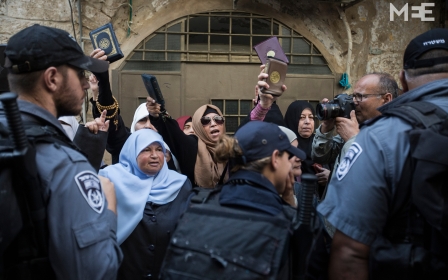Jordan halts Jerusalem al-Aqsa cameras project

Jordan has decided not to install security cameras at Islam's third holiest site, the al-Aqsa mosque compound in Jerusalem, because of some Palestinian doubts, Prime Minister Abdullah Nsur said on Monday.
"We have been surprised by the reactions of some who have made comments expressing their doubts about the aims of the project," the official Petra news agency quoted Nsur as saying.
"Because we respect the point of view of the Palestinians... we believe the project is no longer consensual, but a potential source of conflict, and have decided to end it," he said.
On 20 March, Jordan said it would set up 55 security cameras around the flashpoint compound to monitor any Israeli "violations".
The site - revered by Jews as their holiest site, the Temple Mount - is administered by a Jordanian trust or "Waqf".
In October, after meeting Jordan's King Abdullah II and Palestinian leader Mahmud Abbas, US Secretary of State John Kerry endorsed a plan for cameras at the site in a bid to calm repeated disturbances. Israeli Prime Minister Benjamin Netanyahu agreed.
Kerry hailed the agreement as an important breakthrough at the time, and on Monday his spokesman expressed disappointment that the plan has apparently failed.
"We still see the value in the use of cameras," US spokesman John Kirby said.
"So the Jordanians can speak to this decision that they've made to halt the project. We think it's unfortunate, as we continue to believe in the value of that tool for that purpose and we continue to urge all sides to restore calm and reduce the violence."
Nsur said Amman's main objective had been to install surveillance cameras "at the compound, not inside the mosques, to document repeated Israeli aggressions at the holy places".
Sheikh Raed Salah, leader of the Islamic Movement, had called on Jordan to reconsider the project, fearing that it would become "the eyes of Israel".
Kamal Khatib, deputy head of the Islamic Movement, called the cameras a means to enforce Israeli sovereignty over the compound.
“We reject this completely, not just because of the security implications," he told Middle East Eye. "Muslims are not doing anything wrong by praying at the mosque. We are not making military preparations on al-Aqsa.
"Israel has now achieved what it wants. It can observe everything that moves and can arrest anyone. It is using the cameras to enforce its own sovereignty."
The compound in east Jerusalem, which was occupied by Israel in the 1967 Six-Day War and later annexed in a move not recognised internationally, houses the famed golden Dome of the Rock and the al-Aqsa mosque.
Clashes between Palestinian youths and Israeli security forces erupted at the compound last September amid fears among Muslims that Israel was planning to change rules governing the site, even though Netanyahu has repeatedly said there are no such plans.
The clashes at al-Aqsa preceded a wave of violence that has killed 198 Palestinians, 28 Israelis, two Americans, an Eritrean and a Sudanese since 1 October, according to an AFP count.
New MEE newsletter: Jerusalem Dispatch
Sign up to get the latest insights and analysis on Israel-Palestine, alongside Turkey Unpacked and other MEE newsletters
Middle East Eye delivers independent and unrivalled coverage and analysis of the Middle East, North Africa and beyond. To learn more about republishing this content and the associated fees, please fill out this form. More about MEE can be found here.



